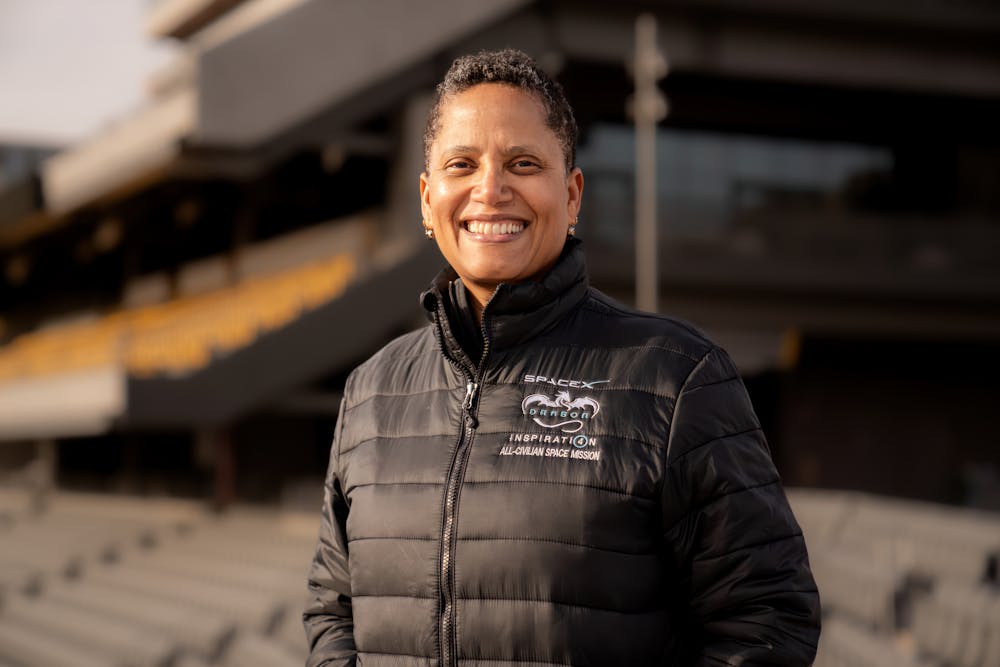Space2inspire Weekend at ASU featured stories from groundbreaking astronauts, who shared their experiences and the inspirations that propelled them into space.
The event, organized by ASU 365 Community Union, was held from Feb. 17 to Feb. 19, as part of Black History Month events at ASU.
Two ASU alumni — Ed Dwight, the first Black American astronaut candidate and Sian Proctor, a science educator and SpaceX astronaut — were honored and recognized as part of the event.
Held at Sun Devil Stadium, the weekend also included a lunch with SpaceX astronauts, a panel on the intersection of space and art, poetry reading, an art exhibition and an art mosaic that was photographed via satellite from Sun Devil Stadium.
Space2inspire, an organization that promotes scientific education through artistic inspiration, was founded by Proctor, who graduated from ASU with a masters in geology and a Ph.D. in science education in 2006.
Proctor founded Space2inspire encouraging students and communities to use their unique "space" to inspire others around them about the wonder of astronomy.
On an individual level, the aim is to become a J.E.D.I., (justice, equity, diversity and inclusion) an acronym Proctor uses to summarize the organization's goals.
"Anyone can be a J.E.D.I.," Proctor said. "Your unique space (can) inspire people by making it just, equitable, diverse and inclusive."
In 2021, Proctor became the first African American woman to pilot a space capsule. She was launched into orbit as the pilot of the Crew Dragon space capsule, a mission that was part of SpaceX’s Inspiration4 private orbital spaceflight program.
She also founded the Proctor Foundation for Art and Science, which helps fund disadvantaged BIPOC students from community colleges, to space camps, as a pathway to a future career in astronomy and science.
"The Black community is going to play a pivotal role in the advancement of human spaceflight," Proctor said, who hopes Space2inspire will help her fellow women of color see themselves in the fields of extraterrestrial exploration.
Sara Sabry, a Blue Origin astronaut who became the first Arab woman in space as part of Blue Origin's NS-22 mission in 2022, was also present at the Space2inspire event.
She founded Deep Space Initiative, a nonprofit organization that helps expand accessibility and opportunities in deep space exploration.
As a young girl growing up in Egypt, Sabry was regularly discouraged from a career in spaceflight.
"You're always told you shouldn't study engineering because of the lack of opportunities that we might not have," Sabry said, who took it upon herself as a necessity to prove her detractors wrong.
Her journey to becoming an astronaut required a lot of discipline, prioritizing long-term focus over short-term gratification.
"Difficulties and challenges hold us back, but you can let them push you forward," Sabry said. "You have so much control in how you take that energy and convert it internally to propel you."
A major focus of the event was visualization; without imagination, solutions to these challenges can feel out of reach. For Sabry, picturing her future gave her endurance against doubt from others.
"Every single night, I would just close my eyes and see myself inside a space capsule before going to bed. As I saw myself doing it, I believed it could really happen," Sabry said.
According to Proctor, watching space-themed television was her inspiration: "For me, it was seeing Star Trek and Nichelle Nichols as Lieutenant Uhura."
Nichols' groundbreaking portrayal of the first female astronaut of color on television is an inspiration for many women of color who now work in astronomy.
River is a senior studying english and mechanical engineering. This is their fourth semester with The State Press.




